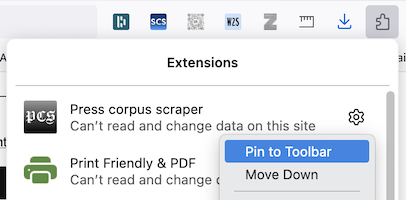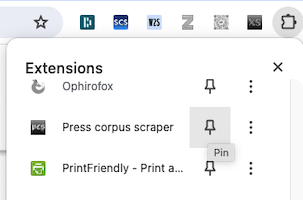Press corpus scraper
Une extension pour extraire et télécharger des articles de presse
An extension for extracting and downloading press articles for text mining.
Important : Data and text mining is limited to research purposes under most legislations. Make sure to comply with applicable copyright law as well as service providers’ terms and conditions.
🚨 New! 🚨 Support for Europresse: log in via your institutional portal.
Cite this program
If you use this extension for your research, please reference it as follows:
Moncomble, F. (2024). Press Corpus Scraper (Version 0.10) [JavaScript]. Arras, France: Université d’Artois. Available at: https://fmoncomble.github.io/press-corpus-scraper/
Installation
Firefox (recommended: automatic updates)
Mozilla’s add-on review process may take time. If you wish to try the latest (developer) version:
- Install Firefox Developer Edition;
- In the address bar, type
about:configand hit Return; - Click
Accept the Risk and Continue; - Search for
xpinstall.signatures.required; - Toggle the setting to
False; - Click here to install the add-on.
Chromium-based browsers (Chrome, Edge, Opera, Ecosia…)
- ⚠️ These browsers are no longer supported. An upgrade of the plug-in is under study to restore compatibility.
- Download .zip archive- Unzip the archive- Open the extensions manager:chrome://extensionsoredge://extensions- Activate “developer mode”- Click “Load unpacked”.- Select the unzipped folder
Remember to pin the extension to the toolbar:


Instructions for use
- Click the icon in the toolbar and choose a source:

- or navigate to a supported website:
- Le Figaro
- L’Humanité
- Le Monde
- Le Point
- The Guardian
- The New York Times
- Deutsches Zeitungsportal
- Süddeutsche Zeitung
- or your institution’s Europresse portal: list of supported institutions
- Europresse & newspaper websites:
- Search by keyword
- (Optional: refine your search)
- A box appears at the top of the results page. Example for Le Monde :
- Choose an extraction option and click
Extract- Paywalled articles are not downloaded but listed as links
- Articles that the extension fails to process are listed as links
- When extraction is complete :
- Firefox: the .zip archive containing the files is automatically downloaded to the default folder
- Chrome/Edge: select the destination folder for the .zip archive
-
Guardian & New York Times:
-
Click on the
PCScraperbutton in the top right-hand corner of the site’s menu bar to open the search window Example from the New York Times :
- Build a query in the interface, then click
Search - Choose
Extract allorExtract sample - Click
Extract articles - Select the desired file format:
TXT,XML/XTZ(for import into TXM with theXML-TEI Zero + CSVmodule) orIramuteq - Click
Download
-
Known issues and limitations
- Newspaper websites: even with an active subscription, the extension may not have access to the full text of paywalled articles (if the cookie is not accepted by the remote server). In that case, only free-access articles are retrieved, the others being listed as links.
- L’Humanité: without a subscription, it is advised to create a free account.
- Europresse
- handles article metadata rather randomly, with no dedicated HTML elements, which can lead to some inconsistency in the way they are rendered in downloaded files (subheads where author name should belong, etc.). This is not a limitation of the add-on but of Europresse!
- only allows scraping 20 pages of results (1000 articles) at a time.
- Deutsches Zeitungsportal:
- the API returns whole newspaper pages, not individual articles;
- because texts are produced by Optical Character Recognition, newspapers originally printed in Fraktur yield mixed results.
- Guardian and New York Times: the query and extraction process relies on the APIs offered by these two publications. An access key is required, which can be obtained free of charge from the following links:
- The New York Times: an active subscription is required to access the full text of all articles, so you need to be logged into your account first. The remote server accepts the cookie sent by the extension (for the time being), but there are a number of limitations and security features:
- requests can only return 10 results at a time, and the API only authorises 5 requests per minute: these are therefore spaced 12 seconds apart to avoid any blocking
- the server blocks fetch requests that are too numerous and too fast: to avoid that, article content is only retrieved at a rate of 1 article per second. Despite this, a block may occur: the extension then invites you to click on a link to prove that you are not a robot…
- the subscriber account can be disconnected at any time: the extension then pauses and prompts you to click on an authentication link before resuming content retrieval.
- The New York Times on Firefox: due to the way Firefox handles the dynamic loading of the NYT’s homepage, it needs to be opened in a new tab or window for the button to appear. In any other case, the button is likely to pop up briefly before disappearing.